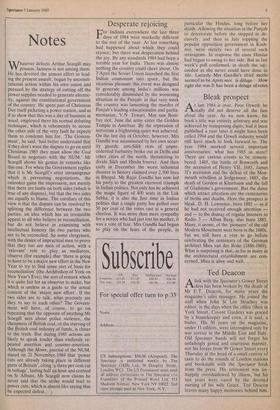Notes
Whatever defects Arthur Scargill may possess, laziness is not among them. He has devoted the utmost effort to lead- ing the present assault, begun by unconsti- tutional action within his own union and pursued by the strategy of cutting off the power supplies needed to generate electric- ity, against the constitutional government of the country. He spent part of Christmas Day itself picketing a power station, and as if to show that this was a day of business as usual, employed there his normal debating technique, which is vehemently to accuse the other side of the very fault he expects them to condemn him for. 'The Govern- ment', he said, 'had better understand that if they don't want the dispute to go on until Christmas 1985 they must allow the Coal Board to negotiate with the NUM.' Mr Scargill shows his genius in remarks like this one. For when the Government replies that it is Mr Scargill's utter intransigence which is preventing negotiations, the onlooker gains the impression, not merely that there are faults on both sides (which is true of any dispute), but that the two sides are equally to blame. The corollary of this view is that the dispute can be resolved by splitting the difference between the two parties, an idea which has an irresistible appeal to all who believe in reconciliation, but do not believe in examining with intellectual honesty the two parties who are to be reconciled. So some clergymen, with the desire of impractical men to prove that they too are men of action, with a 'relevant' role to play as mediators, observe (for example) that 'there is going to have to be a major new effort in the New Year to try to find some sort of basis for reconciliation' (the Archbishop of York on New Year's Eve); the sort of remark which it is quite fair for an observer to make, but which is useless as a guide to the actual content of the 'major new effort'. If the two sides are to talk, what precisely are they to say to each other? The Govern- ment will have, of course, to go on repeating that the opposite of anything Mr Scargill says about police violence, the cheapness of British coal, or the starving of the British coal industry of funds, is closer to the truth. But during 1985 actions are likely to speak louder than endlessly re- peated assertion and counter-assertion. Although the Miner, journal of the NUM, stated on 21 November 1984 that 'power cuts are already taking place in different parts of Britain', citing 'a three per cent cut in voltage', lasting half an, hour and centred on St Albans, Mr Scargill now claims he never said that the strike would lead to power cuts; which is almost like saying that he expected defeat. ,






































 Previous page
Previous page